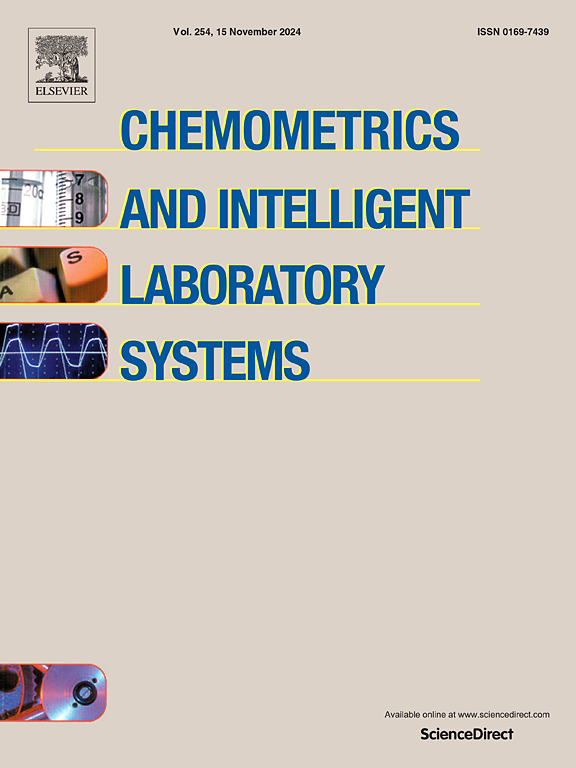用典型因式分解对多块方法进行基准测试
IF 3.7
2区 化学
Q2 AUTOMATION & CONTROL SYSTEMS
Chemometrics and Intelligent Laboratory Systems
Pub Date : 2024-10-02
DOI:10.1016/j.chemolab.2024.105240
引用次数: 0
摘要
在实践中,对相同观测数据进行测量并按变量块(来自不同的测量源或根据用户指定的主题推导)组织数据的情况很常见。多区块探索方法是一种有用的工具,可以从缩小的、可解释的共同空间中提取数据信息。然而,许多方法都是独立提出的,用户在选择合适的方法时往往会迷失方向,特别是这些方法并不总是能得出相同的结果,或者因为输出的形式不尽相同。为此,我们引入了正则因式分解的数据分解方法,并将其应用于一些广泛使用的方法,如 CPCA、MCOA、MFA、STATIS 和 CCSWA。这些方法在结构受控(或已知)的模拟(或真实)数据上进行了比较。理论和实践结果都表明,必须事先对块结构进行仔细研究。块变量的数量和块变量在维度上的分布会影响块比例的选择。块内和块间的观测结构也会影响方法的选择。CPCA 或 MCOA 混合了共同信息和特定信息,STATIS 只强调共同结构,而 CCSWA 则侧重于特定信息。为实现这些诊断,可在 R、Matlab 或 Galaxy 上使用各种方法和建议的比较工具。本文章由计算机程序翻译,如有差异,请以英文原文为准。
Benchmarking multiblock methods with canonical factorization
Data measured on the same observations and organized in blocks of variables — from different measurement sources or deduced from topics specified by the user — are common in practice. Multiblock exploratory methods are useful tools to extract information from data in a reduced and interpretable common space. However, many methods have been proposed independently and the users are often lost in selecting the appropriate one, especially as they do not always lead to the same results or because outputs do not have the same form. For this purpose, the data decomposition by canonical factorization was introduced thus applied to some widely-used methods, CPCA, MCOA, MFA, STATIS and CCSWA. The methods were compared on simulated (resp. real) data whose structure is controlled (resp. known). Theoretical and practical results pinpoint that the block-structure must be carefully explored beforehand. The number of block-variables and the block-variance distribution along dimensions impacts the choice of the block-scaling. The observation-structure within and between blocks impacts the choice of the method. CPCA or MCOA mix common and specific information, STATIS highlights common structure only whereas CCSWA focuses on specific information. To enable these diagnoses, methods and proposed comparison tools are available on R, Matlab or Galaxy.
求助全文
通过发布文献求助,成功后即可免费获取论文全文。
去求助
来源期刊
CiteScore
7.50
自引率
7.70%
发文量
169
审稿时长
3.4 months
期刊介绍:
Chemometrics and Intelligent Laboratory Systems publishes original research papers, short communications, reviews, tutorials and Original Software Publications reporting on development of novel statistical, mathematical, or computer techniques in Chemistry and related disciplines.
Chemometrics is the chemical discipline that uses mathematical and statistical methods to design or select optimal procedures and experiments, and to provide maximum chemical information by analysing chemical data.
The journal deals with the following topics:
1) Development of new statistical, mathematical and chemometrical methods for Chemistry and related fields (Environmental Chemistry, Biochemistry, Toxicology, System Biology, -Omics, etc.)
2) Novel applications of chemometrics to all branches of Chemistry and related fields (typical domains of interest are: process data analysis, experimental design, data mining, signal processing, supervised modelling, decision making, robust statistics, mixture analysis, multivariate calibration etc.) Routine applications of established chemometrical techniques will not be considered.
3) Development of new software that provides novel tools or truly advances the use of chemometrical methods.
4) Well characterized data sets to test performance for the new methods and software.
The journal complies with International Committee of Medical Journal Editors'' Uniform requirements for manuscripts.

 求助内容:
求助内容: 应助结果提醒方式:
应助结果提醒方式:


